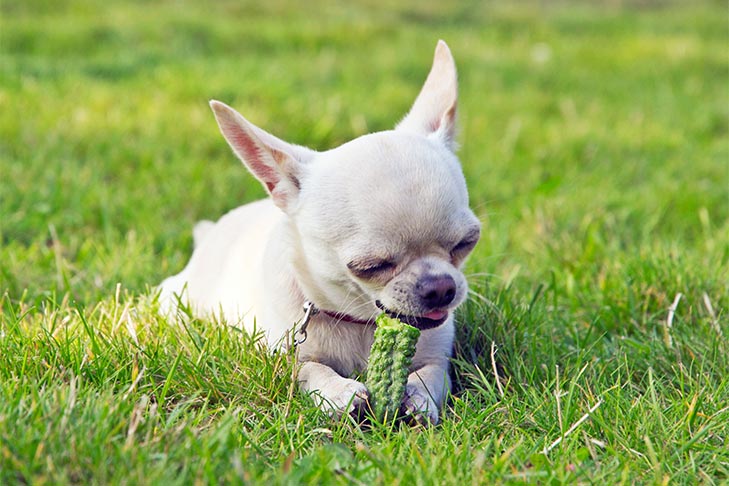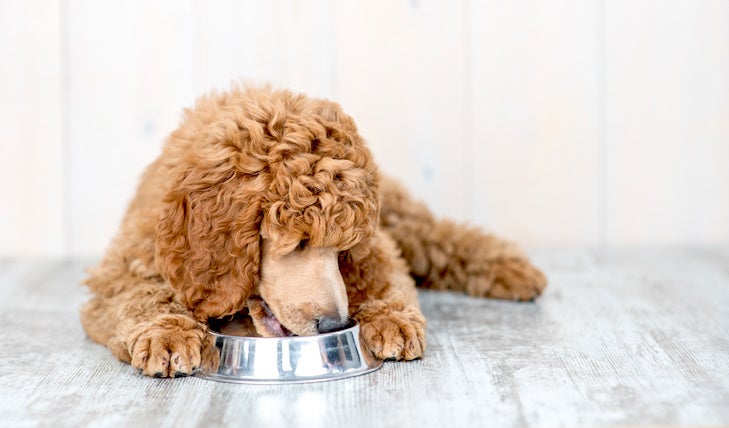AKC is a participant in affiliate advertising programs designed to provide a means for sites to earn advertising fees by advertising and linking to akc.org. If you purchase a product through this article, we may receive a portion of the sale.
Crispy, crunchy, with a salty-sour taste, pickles make a tasty addition to many human meals. But can dogs eat pickles? The answer isn’t a definitive yes or no. While pickles aren’t necessarily harmful, they are extremely high in sodium, and lots of salt isn’t healthy for dogs.
Pickles also contain ingredients that could be potentially harmful. “Although pickles contain vitamins and minerals beneficial to us, the negative aspects far outweigh the benefits for a dog,” says Dr. Carly Fox, Senior Veterinarian, Emergency and Urgent Care at the Schwarzman Animal Medical Center of New York City. “Overall, they aren’t a great choice to feed your dog.”
Can Dogs Have Pickles?
Pickles are cucumbers preserved in a salt-water brine, along with vinegar and other spices, which is where the high sodium content comes from. They come in a variety of flavors, some hotter and zestier than others, and may contain ingredients that are toxic or unhealthy for a dog. Since there isn’t a standard recipe when it comes to the way they’re made, it’s important to know what they contain before you share one with your dog.

The dill pickle, one of the most popular, is a cucumber soaked in brine (usually made from vinegar, water, and salt) and mixed with dill, a fresh herb that contains antioxidants. If you want your dog to get the benefits that the herb provides, Dr. Fox suggests adding fresh dill to your dog’s food.
Other types of pickles, such as the bread-and-butter type, are sweeter. Made with cucumbers, brine, peppers, onions, garlic, sugar, and spices, they contain ingredients that can be unhealthy for dogs. “Garlic and onions are toxic to dogs and cause damage to their red blood cells, which leads to anemia,” says Dr. Lucas White, a veterinarian with Sunset Veterinary Clinic in Edmond, Oklahoma. And while these pickles likely will not have enough garlic or onion in them to cause a problem, Dr. White suggests avoiding feeding them to your dog, just to be on the safe side.
The hot-and-spicy pickles are another type, typically made with cucumber, brine, chili pepper, and other spices. These ingredients can be harsh on a dog’s stomach. After all, dogs aren’t used to eating spicy foods, which can cause GI upset, which may make your dog vomit or experience doggie diarrhea.
Are Pickles Safe for My Dog?
In addition to the spices, the high sodium content can be especially problematic for dogs with underlying medical conditions. Dr. Fox adds that consuming a large amount of sodium in a short amount of time can cause side effects. Your dog may experience seizures, excessive thirst, vomiting, diarrhea, or ataxia (loss of balance).
Sodium is an important part of a dog’s diet. A small amount is necessary for normal body function, and if sodium levels drop too low, it can be dangerous, placing both the body and brain at risk. The Association of American Feed Control Officials (AAFCO) recommends that commercial dry dog food contain at least 0.3% of sodium, which allows for maintenance, growth, and development in the body.

Since sodium is already a part of your dog’s diet, Dr. Fox advises owners to be careful of additional foods, like pickles, that will elevate salt levels. For example, she advises that 100 milligrams of sodium is a good daily maximum for a medium-size dog.
If you’re looking for a healthy snack option to share with your dog, both Dr. Fox and Dr. White suggest plain cucumbers as an alternative. They contain the same vitamins and minerals as pickles without the negative ingredients. Talk to your veterinarian before giving your dog a new food, and incorporate the new food into their diet slowly.

